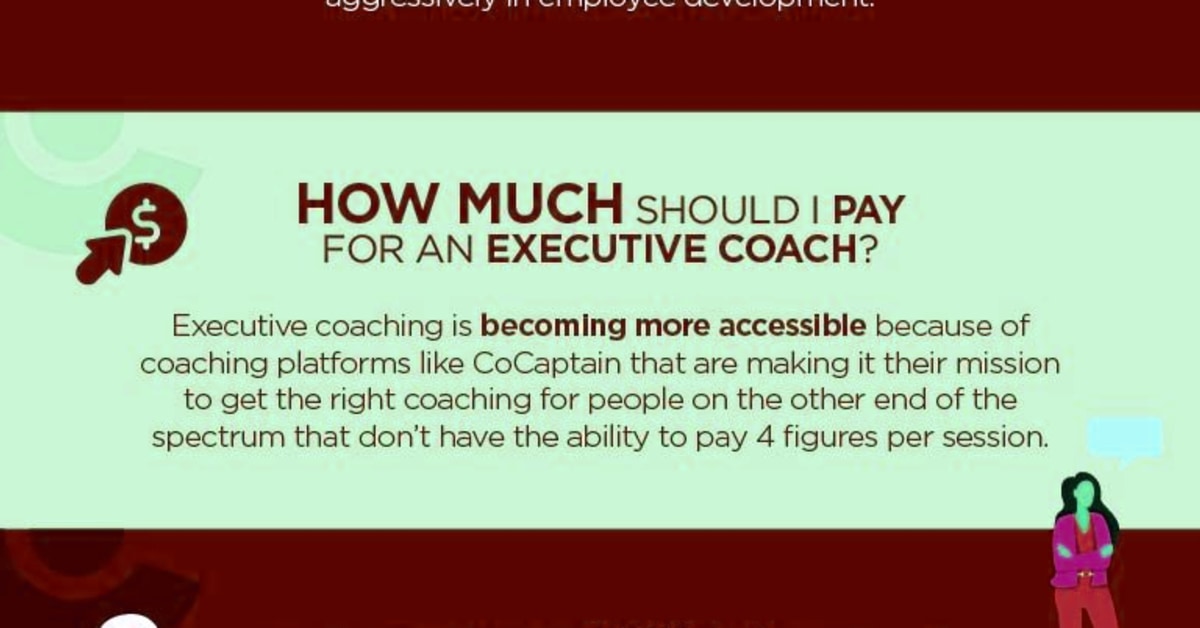Who pays for executive coaching?
 by Consultant
by Consultant

Working with an executive coach can generate the self-awareness you need to unlock your potential and advance your career. Meeting one-on-one with senior managers or leaders within an organization (such as a director, vice president, president, or member of the C-suite), the executive coach provides a safe, structured, and trustworthy environment in which to offer support for the individual. The primary aim of executive coaching is to improve leadership and management performance, often by developing the individual’s self-awareness, emotional . The primary aim of executive coaching is to improve leadership and management performance, often by developing the individual’s self-awareness, emotional .
While professional coaching certification isn’t required to become an executive coach, it offers clients security and peace of mind to know they’re in qualified hands. A recent study found that 77% of executives who worked with a coach found improvements to at least 1 of 9 business measures, with overall productivity and employee satisfaction receiving the largest increase. If you’re ready to take the next step to become a great leader but aren’t sure what it should be, executive coaching is for you. At one time, executive coaches only worked with a company’s topmost leaders, helping struggling leaders or assisting with challenges.
An executive coach specializes in supporting clients as they develop the leadership and high-level skills necessary to succeed as business leaders. The primary aim of executive coaching is to improve leadership and management performance, often by developing the individual’s self-awareness, emotional intelligence, and capacity to influence others. Become an Independent Executive Coach by choosing the path that will meet your needs and enable your success. As impressive as these results are from a business standpoint, executive coaching is even more impactful for the individual.
These benefits underscore the transformative impact of executive coaching on an individual’s professional and personal growth and an organization’s overall success.
What is the focus of executive coaching?
Improving communication and interpersonal skills; Developing effective networks and relationships; Addressing difficult conversations and conflict management . They learn to understand their team’s strengths and weaknesses and leverage them to achieve their goals. They learn to manage their time effectively and make sound decisions that benefit the company’s performance.
What problems does executive coaching solve?
Through personalized guidance and practical advice, leaders can navigate career advancement with confidence and adaptability. Executive coaches assist leaders in clarifying their career goals, identifying strengths and transferable skills, and developing strategies for success. Conflict is inevitable in any workplace, but effective leaders know how to manage and resolve conflicts constructively. Even more concerning, when an executive’s problems stem from undetected or ignored psychological difficulties, coaching can actually make a bad situation worse.
Executive coaches help leaders develop conflict resolution skills, such as active listening, empathy, negotiation, and mediation.
References:
Related Posts
Working with an executive coach can generate the self-awareness you need to unlock your potential and advance your career. Meeting one-on-one with senior managers or leaders within an organization (such as a director, vice president, president, or member of the C-suite), the executive coach provides a safe, structured, and trustworthy environment in which to offer…
Business Consulting Articles
- About cookies and cookie consent
- Advisory Consulting
- Business Growth Consulting | Unlocking Your Business Potential
- Business Process Consulting Services Can Improve Your Business
- Organizational Development Consultant
- Privacy Policy
- Strategic Advisory Services Explained: A Comprehensive Guide
- Top 100 Advisory Consulting Terminology
- Top 100 AI as a Service (AIaaS) Terminology
- Top 100 Business Consulting Terminology
- Top 100 Executive Coaching Terminology
- Top 100 Operation Management Terminology
- Top Advisory Consulting Terminology
- Top AI as a Service (AIaaS) Terminology
- Top Business Consulting Terminology
- Top Executive Coaching Terminology
- Top Operation Management Terminology
- AI Generated Q&As
- Benefits of advisory consulting
- Blog
- Boutique Firms
- Budgeting
- Business advisory consulting
- Business Consulting
- Business consulting services
- Business Management
- Business planning
- Case studies on specific industries
- CEO
- CFO
- Change management
- CIO
- Client success stories
- CMO
- Collaboration and partnerships
- Consulting
- COO
- Creative thinking
- Critical thinking skills
- Culture and values
- Executive Coaching
- Expert guidance and insights
- Financial advisory consulting
- Financial analysis
- Financial consulting
- Financial Consulting
- Financial consulting services
- Financial strategies
- Fractional Executive
- Goal setting
- Human Resource Management
- Increased efficiency and profitability
- Industry knowledge and experience
- Insight
- Investing
- IT Consulting
- Leadership and management
- Leadership styles
- Management Consulting
- Management Consulting
- Market analysis
- Market analysis
- Marketing consulting
- Marketing strategies
- Marketing strategies
- Methodologies
- Operational strategies
- Organizational structure
- Process improvement
- Professional qualifications and certifications
- Retirement planning
- Risk analysis
- Risk management and compliance
- Sales techniques
- Scaling and expansion
- Strategic consulting
- Strategic foresight
- Team diversity and collaboration
- Technology advisory consulting
- Technology consulting services
- Technology solutions
- Testimonials from satisfied clients
- Tier 1 Firms
- Tier 2 Firms
- Vision and direction
- What is Advisory?
- What is Consulting?
